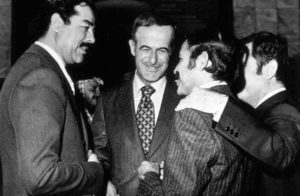
With the decline of the old colonial powers such as Great Britain and France after World War II, the Soviet Union stepped into the stage of the Middle East as the major superpower. The process was hastened through the advent of various forms of movements and revolutions for independence in the Middle East during the 1950s and 1960s. The Soviets, who previously had hardly any chance for colonizing the region, found their propitious moment to present themselves as champions of the cause of “anti-colonialism” and “anti-imperialism”, and by that to embark upon their own full-fledged project of expansionism in the Middle East.
In the meantime, the emergence of the Jewish State in the former British colony of Palestine precipitated the Russian intervention in the Middle East. Contrary to what might be popularly believed, during the initial phases of the life of modern Israel, the Soviet Union assumed a favorable stance towards it. Though the Communists were suspicious of the Zionist movement lest it provoke the Jewish Russians and Ukrainians, the Soviet Union voted in favor of the UN partition plan for Palestine in 1947. In addition, when the first all-out war broke out between Jews and Arabs in 1948, the Soviet Union stepped in again to supply the Jews with much-needed arms.
Whatever the reason for this initial assistance to Israel, the Soviet Union eventually found its main allies in the Middle East not in the Jews but in the Arabs who, as it happened, were partly provoked to a high-pitched revolutionary nationalist mood as a consequence of the rise of a highly nationalist-conscious Jewish State in their neighborhood. Indeed it can be said that Stalin’s gambit with Israel paid off with pulling the Arabs towards the Soviet pole in the long run.
In that climate, the Tsarist “civilizing mission” that, as a principal part of the Communist ideology in the Soviet Union, had now become couched in the pompous claim of “historical responsibility” of “liberating the oppressed nations”, would appeal to many Arabs and would most significantly turn into a constant of the Arab revolutions and the states that emerged from them. By then, the Ba’ath ideology, which mingled a highly distilled Arab Nationalism with a somewhat diluted Soviet Communism, became the most apparent manifestation of Russophilia in the Middle East.
The roots of the Ba’ath go back to the early 1940s when two Syrian Communist intellectuals, namely Michel Aflaq and Salah al-Din al-Bitar, in their desire to make an “Arab Renaissance” after the dismantling of the ancient colonial empires, started to draw the contours of an eclectic Arab revival. Ba’ath itself means “renaissance” in Arabic. Ba’athism promoted as its most basic principles anti-imperialism, anti-Israelism, Pan-Arabism, Arab unity, Arab Nationalism, and Arab Socialism. In a traditional culture where old family and tribal ties played the most significant part in power politics, as a result of which the majority of the population would have to stay out of politics and only watch their betters act, the Ba’ath ideology promised a new hope for social justice.
Syria and Egypt were the first Arab states to embrace modified forms of Arab Socialism/Ba’thism, and later Iraq, Yemen and Libya would follow suit. Riding the popular waves of revolutions and coups against obsolete and corrupt monarchies, the socialist military rose to power in those countries. That is why the backbone of Arab Socialism was – and still is – militarism. While the ancien régime would prop itself up on the support of the land-owners and propertied middle class, Arab Socialism would find its most vocal proponents among the ranks of the poor and the working class as well as the intellectuals.
However, despite its profession to socialism, in reality Arab Socialism would mostly depend on populism, charismatic rule, and militarism. Already nurturing the seeds of despotism, from the early 1960s all kinds of Arab Socialism, including Ba’athism, drifted towards ruthless dictatorships. The bloody 1958 coup in Iraq that brought to power General Abd al-Karim Qasim and then the 1966 coup in Syria that laid the foundations of the future Assad autocracy manifested such developments in the Ba’ath ideology towards a more authoritarian form of government, which in distinction to Ba’athism proper is usually called “Neo-Ba’athism.”
The civil war in Yemen that was sparked as a result of a Communist takeover was another major trend towards the rise of the more authoritarian form of Arab Socialism. When the Communist army officers deposed Imam Muhammad al-Badr, the king of Yemen, and established a revolutionary government in the Republic of North Yemen, Badr sought the assistance of Jordan and Saudi Arabia, the two foremost Arab monarchies at that time, to make war on the revolutionaries. Naturally, Egypt would militarily intervene on behalf of the revolutionary government while the Soviet Union would provide strategic and technical assistance. The proxy war between the old-guard Arab Monarchists and the vanguard Arab Socialists continued up to the late 1960s when the Arabs’ confrontation with Israel would put a necessary stop to the conflict among themselves.
Egypt’s dramatic change of policy towards Israel and the Soviet Union, which effectively terminated the project of Russian expansionism in the Middle East, had dire consequences for Ba’thism. Thenceforward, with the gradual decline of the Ba’ath ideology and the fall of most of the Ba’athist despots and dictators like Saddam Hussein, the Soviet cultural hegemony would also recede from the region. As a result, the last bulwark of that trend of Russophilia in today’s Middle East proves to be the Assad regime in Syria, where Russians have a stake: their last Middle Eastern naval facility in the Syrian port of Tarsus. It’s no wonder why President Putin of Russia is intent upon keeping the genocidal Assad in power at any cost.